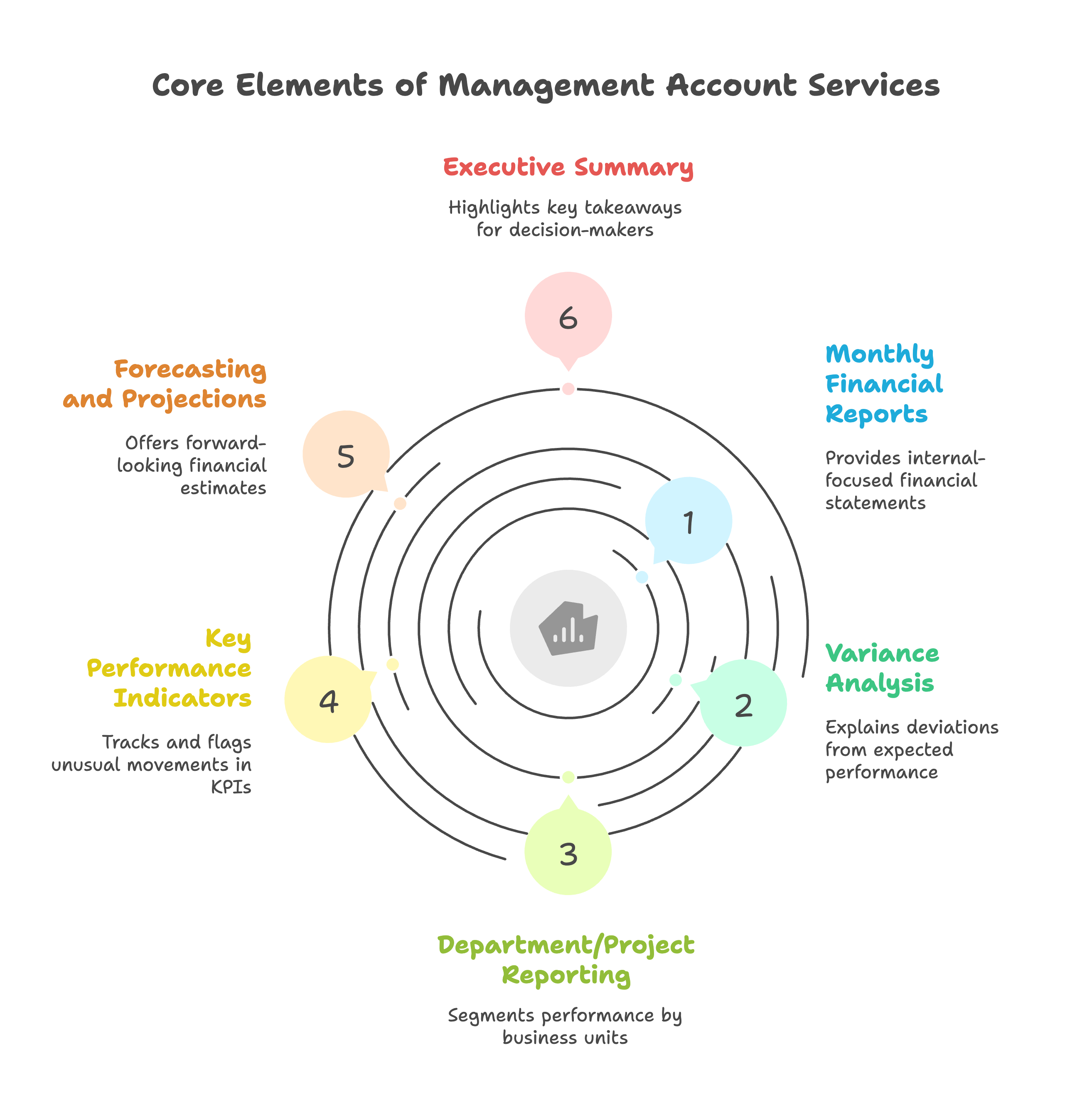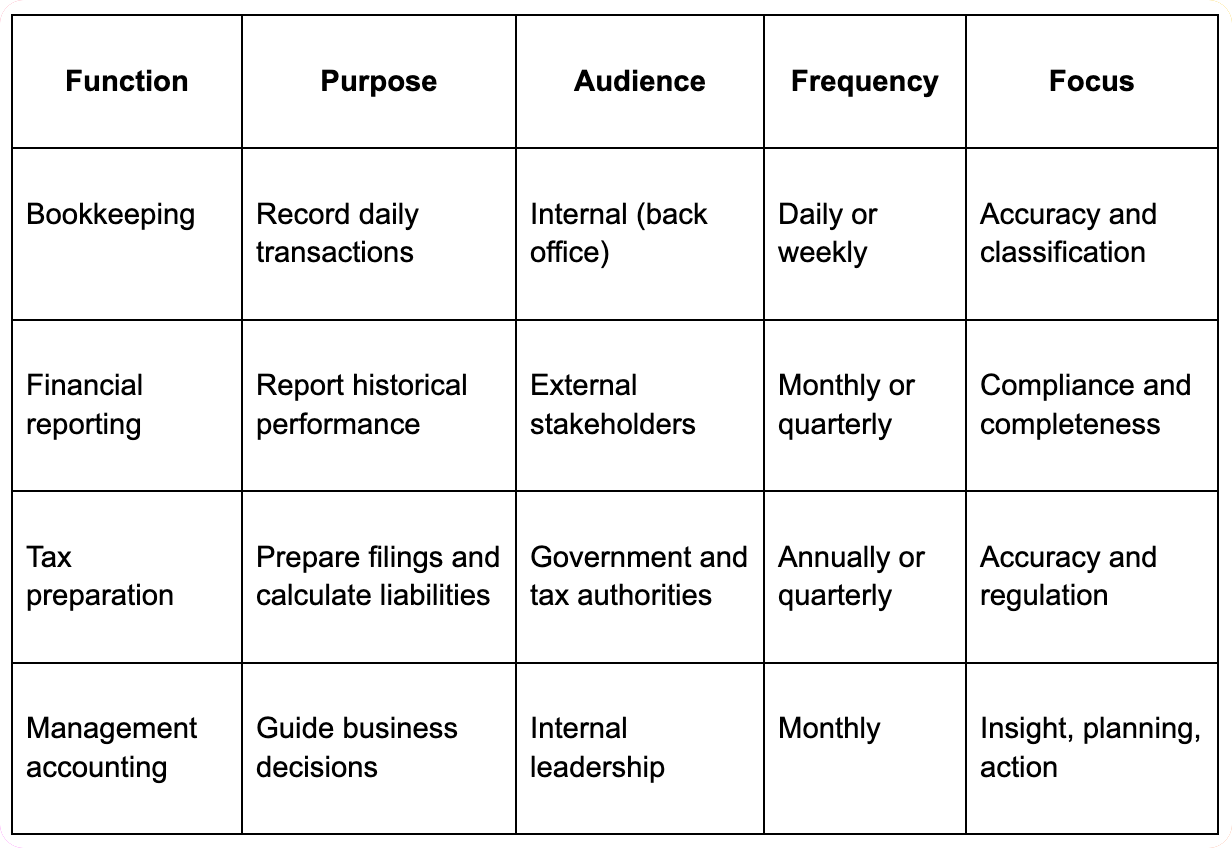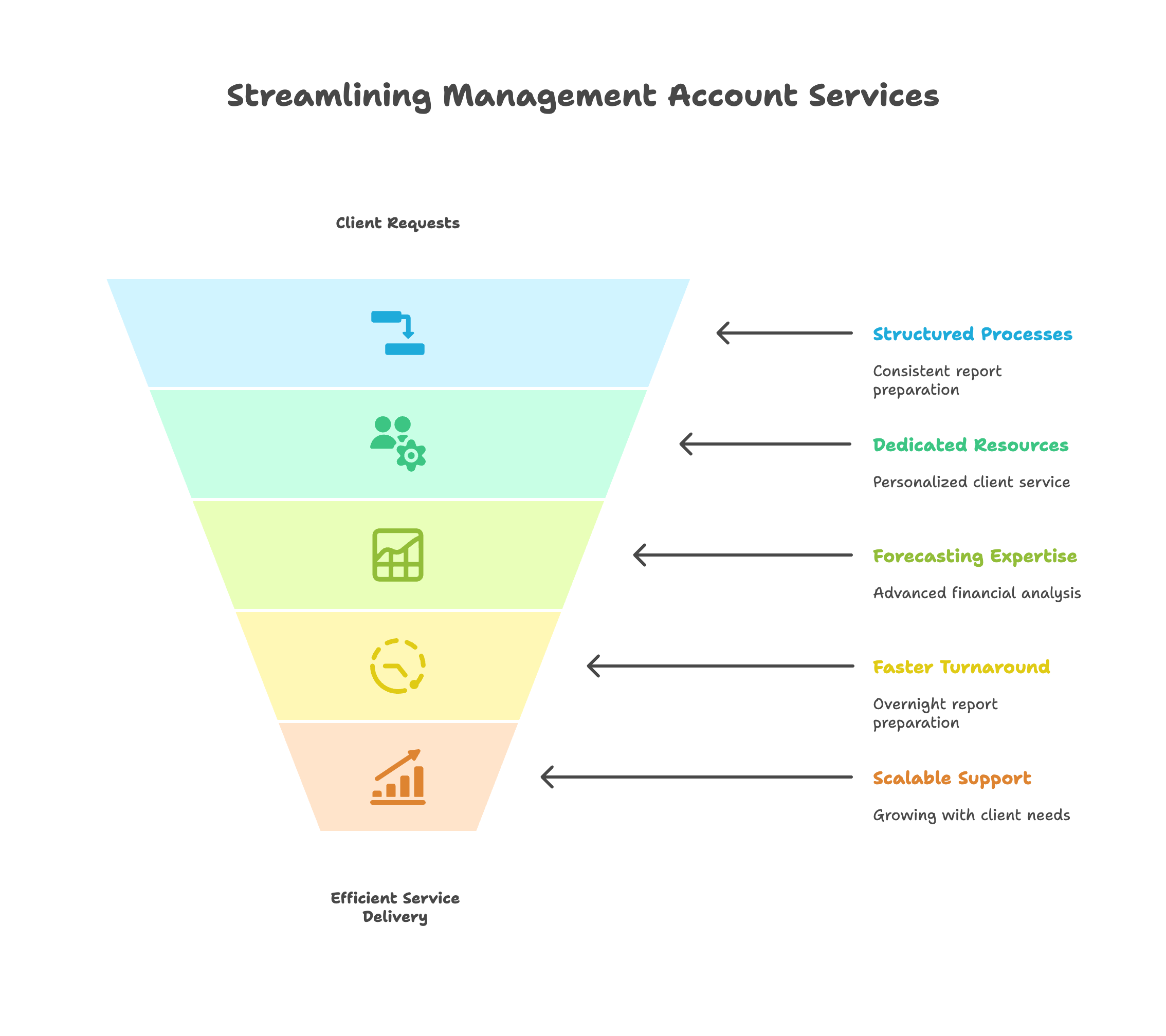Financial records are not just for filing taxes or satisfying auditors. When used correctly, they become a powerful tool for decision-making. That is the role of management account services.
Unlike statutory accounting, which focuses on compliance, management accounting is forward-looking. It transforms financial data into insight that help businesses plan, budget, and grow. From cash flow forecasting and cost analysis to department-level reporting and KPI dashboards, management account turn raw numbers into a strategic asset.
For CPA firms, offering management account services opens up new advisory opportunities. Clients gain visibility into their operation, while firms deepen relationships and create recurring revenue streams. However, preparing reliable management account takes time, structure, and ongoing collaboration - resources that many firms struggle to provide in-house.
Madras Accountancy supports U.S.-based CPA firms with offshore teams trained in preparing clean, timely, and decision-focused management reports. This allows firms to expand their accounting service offerings without adding internal headcount or overloading staff.
In this article, we will explain what management account services include, how they differ from other accounting functions, and how firms can offer them at scale through outsourcing to enable better client service.
Management account services refer to the preparation and delivery of financial reports designed to support internal decision-making. These are not filings for the IRS or reports for external auditors. Instead, they help business owners, executives, and department heads understand the current state of their operation and plan for what comes next.
Unlike traditional financial statements that are often produced quarterly or annually, management account are typically prepared on a monthly basis. They may include standard financial metrics as well as custom dashboards or department-level breakdowns.
The goal is to provide clear, timely information that can be used to answer key business questions. These might include:
By answering these questions regularly, businesses can course-correct early instead of reacting too late, improving overall efficiency in their decision-making process.
Management account are highly customizable, depending on the industry, size of business, and leadership preferences. However, most service packages include several core elements.
This includes:
These reports are formatted for internal use. That means they focus on clarity and relevance, not just compliance.
This section explains why performance differs from expectations. It may show that marketing costs spiked due to a campaign launch, or that customer payments were delayed, reducing cash inflow. Variance analysis provides context, not just numbers, delivering valuable insight into business performance.
Larger businesses often want to see performance segmented by business unit, location, or team. This allows leaders to identify which areas are driving results and which ones need attention.
KPIs vary by industry but may include:
Management accountants track these indicators and flag any unusual movement.
Forward-looking analysis is what separates management accounting from basic reporting. A good service includes revenue forecasts, expense projections, and cash flow estimates based on current trends and planned activities.
Each report should include a summary that highlights key takeaways. This helps busy decision-makers understand what happened, what changed, and what they need to act on.

Many businesses operate reactively. They look at last month's numbers, then try to explain what went wrong. Management accounting helps them shift to a more proactive model.
Here is what businesses gain when they use these services.
Leadership teams often struggle to understand whether their business is healthy. They see sales coming in and invoices going out but cannot answer questions like, "Are we profitable?" or "Are we spending wisely?"
Management account provide those answers in a consistent, digestible format.
Instead of waiting for annual reports or tax returns, managers get monthly updates. This allows them to adjust spending, hiring, or strategy in real time.
By comparing budget to actuals each month, companies can spot overspending early. This helps them stay within budget and reduce waste.
Investors want updates. Lenders need assurance. With consistent management account, businesses can share detailed reports that show how the company is performing and what steps are being taken to improve.
Whether launching a new product, expanding into a new market, or hiring a larger team, businesses need data to plan with confidence. Forecasts and scenario modeling from management account help guide these decisions.
It is easy to confuse management accounting with other types of financial work. Here is how it stands apart.

The key difference is that management accounting looks forward, not just back. It asks, "What should we do next?" instead of just, "What happened?"
CPA firms already have access to client data. They manage the books, file the taxes, and sometimes prepare financial statements. This gives them a perfect foundation for offering management accounting as an additional accounting service.
Here is why more firms are adding it to their advisory portfolio.
When you help a business owner understand their performance and plan ahead, you move from being a vendor to a strategic partner. This increases retention and referrals.
Management account services are typically billed monthly. This creates predictable, recurring income for the firm instead of relying only on tax season or one-time engagements.
Many CPA firms focus only on compliance. Offering management accounting positions your firm as forward-thinking and client-focused.
When you track a client's performance monthly, you can identify when they need other services. For example, cash flow issues may lead to tax planning. Margin pressure may suggest a cost review or pricing strategy project.
Despite the clear benefits, many firms hesitate to offer this service. Here is why.
Preparing management reports is time-intensive. It requires pulling data, formatting reports, writing summaries, and often, reviewing numbers with the client. During busy season, this work often gets delayed.
Without a dedicated process, management account may be prepared differently each time. This reduces quality and makes it hard to scale.
Not every team member has experience in budgeting, forecasting, or variance analysis. Delivering strategic insight requires training that many bookkeepers or staff accountants do not have.
Hiring a dedicated management accountant is expensive. Most firms cannot justify the cost unless they already have a large number of clients using the service.
Outsourcing management account preparation to an offshore partner helps firms offer this service without overloading their team.
Offshore teams use templates and schedules to prepare consistent reports each month. This creates a professional experience for clients and saves time for partners.
Your firm gets a specific team member assigned to each client. This person learns the client's business and delivers reports based on your firm's standards.
Experienced offshore teams can support budgeting, cash flow forecasting, and what-if analysis. They know how to build models that match client expectations and provide actionable insight.
With time zone advantages, reports can be prepared overnight and ready for partner review by morning. This improves your ability to deliver on time.
As more clients request management account, your offshore team can grow with you. There is no need to hire locally or slow down other services.
Madras Accountancy provides U.S.-based CPA firms with trained offshore professionals who specialize in management account services. We help you build and maintain this offering without adding internal pressure.

To deliver high-quality management account, make sure your reports include:
This ensures the reports are not just accurate, but also useful.
Not every client needs this service. But certain businesses benefit more than others.
They need visibility into cash flow, burn rate, and hiring impact. Management account support investor updates and internal planning while providing critical insight into business operations.
Product-based companies need to track margins, cost of goods sold, and inventory levels monthly. Management accounting helps avoid stockouts or overbuying.
These firms run on billable hours. Monthly performance reports help them monitor utilization, capacity, and client profitability.
Multi-location businesses need location-level reports and comparisons. Management account help them track who is performing well and who needs support.
Founders who are not financially trained often need help interpreting data. Management accounting makes their numbers easier to understand and act on.
For businesses with existing finance teams, management account services can complement internal capabilities. Finance professionals can focus on strategic analysis while outsourced teams handle report preparation and data compilation. This collaborative approach ensures that accounting processes remain efficient while providing the detailed insight leadership teams need.
Management account services turn raw financial data into decisions. They help businesses plan, act, and grow with confidence. For CPA firms, they represent a path to deeper relationships, recurring revenue, and higher-value conversations.
Offering this service requires time, structure, and consistency. Most firms struggle to build this in-house. That is where offshore support makes a difference.
The benefits extend beyond just accounting - these services provide strategic insight that can transform how businesses operate and make decisions about their finance strategies.
Madras Accountancy helps CPA firms deliver clean, timely, and actionable management account every month. We work behind the scenes so you can lead from the front.
If your firm is ready to move beyond compliance and into strategic advisory, management account services are the place to start. Let us help you get there.

A practical comparison of hiring a freelancer vs using a dedicated offshore accounting team, focusing on continuity, quality control, security, and scaling.

How CPA firms outsource payroll and 1099 work to reduce penalties and admin load, with a clean workflow for approvals, filings, and year-end reporting.

Practical do's and don'ts for CPA firms outsourcing accounting work, based on common failure points and what successful rollouts do differently.